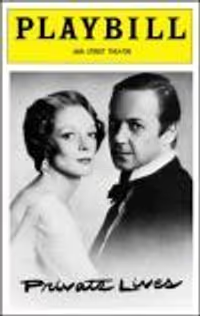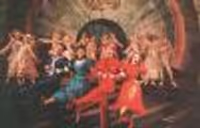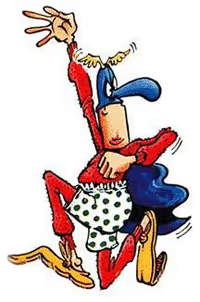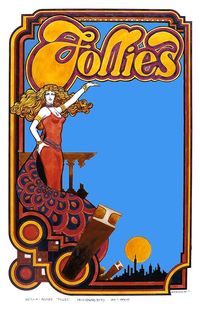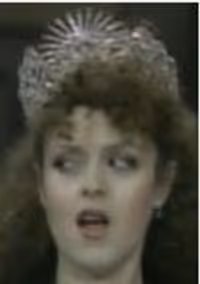A Sondheim rhyme that bothers me
#25A Sondheim rhyme that bothers me
Posted: 10/28/11 at 3:39pm
I agree about "classes in optical art," Pal Joey. And the phrase seems particularly forced for Joanne, even trashed, or any other girl who stays smart.
But, I'm completely charmed by "flatly, I'll stand on my little flat feet and say," Michael Bennett. The double use of "flat" aptly revealing Nellie's tidy, good-natured, smart-but-corny self-encouragement.
#26A Sondheim rhyme that bothers me
Posted: 10/28/11 at 3:51pm
The Sondheim rhymes that bother me are in Sunday:
What's the muddle in the middle?
That's the puddle where the poodle did the piddle.
Too self-consciously clever by half. Takes me right out of the show every time.
#27A Sondheim rhyme that bothers me
Posted: 10/28/11 at 4:09pm
Oh, I always liked that one! It is almost too clever, but I feel like George is being clever, assuming the characters and playing around with voicing their thoughts.
But I certainly see your objection.
#28A Sondheim rhyme that bothers me
Posted: 10/28/11 at 4:25pm
Every time "Fleet Street" is used as an internal rhyme, mostly just during the "Ballad of Sweeney Todd" I cringe a bit.
It just seems so cheap and so unlike Sondheim.
#29A Sondheim rhyme that bothers me
Posted: 10/28/11 at 4:30pm
Back to Sweeney, can anyone explain the line in "Ladies in Their Sensitivities" when the Beadle sings:
"Meaning no offense, it
Happens they RESENTS it,
Ladies in their sensit-
Ivities, my Lord."
Why so grammatically incorrect for the properly-educated Beadle? That one always stuck in my craw.
#30A Sondheim rhyme that bothers me
Posted: 10/28/11 at 4:35pm
Is the Beadle properly educated, though? He always seemed like the judge's thug to me, though trying to seem like one of his betters because of that association.
I'd love for one of our UK friends to tell us if the lower-class speech rings true for that character. I really don't know.
#31A Sondheim rhyme that bothers me
Posted: 10/28/11 at 4:38pmIt always seemed odd to me too, Charles. Maybe, Sondheim thought he could justify it as a bit of the pre-cultivated Beadle coming out, and that the disconnect resonates with his duplicitousness?
#32A Sondheim rhyme that bothers me
Posted: 10/28/11 at 4:39pmSeems to me Sondheim got into a rhyming tunnel and couldn't climb out without downgrading Beadle's education for this ONE MOMENT ONLY not to be repeated in the rest of the show. Lame.
#33A Sondheim rhyme that bothers me
Posted: 10/28/11 at 4:39pm
Is Beadle Bamford in a different sort of position than Mr. Bumble, the beadle from "Oliver Twist"? He certainly mangled the language.
Would they have been similar types, class- and education-wise?
#34A Sondheim rhyme that bothers me
Posted: 10/28/11 at 4:41pm
Hmm, I hadn't realized it was his one language glitch.
I see what you mean.
#35A Sondheim rhyme that bothers me
Posted: 10/28/11 at 4:44pmI was being silly, of course, but I was instantly reminded of the "little death" subtext thread and some of the comments posted there which I found a bit amusing. But sometimes I do find the Sondheim adoration of a very select few to be quite alarming.
Gaveston2
Broadway Legend Joined: 6/28/11
#36A Sondheim rhyme that bothers me
Posted: 10/28/11 at 5:25pm
"...and tastes like it's ****ty." I.e., covered with ****.
Obviously, Lovett doesn't know she is singing in rhyme, so substituting "Well, pity..." is a joke that calls attention to the lyricist. But using a rhyme as a euphemism is such a longstanding (i.e., since before American musical theater) lyric convention, I don't consider this a crime (even though it appears to contradict things that Sondheim says elsewhere).
Mrs. Lovett has "limited wind" unlike Mrs. Moony, the latter being able to catch cats. Lovett has already set up the contrast, so I don't know why this second reference is so disturbing.
The beadle in SWEENEY seems quite pompous and pretentious. I think Reg is right that he wants to escape his working-class origins. Maybe the grammatical error is simply a slip on his part. I'd have to review the libretto carefully to say there are no others; if not, that seems careless.
As for "classes in optical art", I seriously doubt Joanne ever took one. I think she's just being sarcastic about women who are slaves to trendiness. Yes, of course, Joanne herself is one of the "ladies who lunch," but that doesn't mean she does everything listed in that song.
But while we're criticizing one of the great theater lyrics, who says "a piece of Mahler's" instead of "a piece by Mahler" or "a Mahler piece"?
"I'm going to hear a piece of Chopin's."
"I'm going to see a show of Sondheim's."
Sorry. I don't hear it. But the lyric to "Ladies Who Lunch" is so brilliant in so many ways, I'm willing to overlook the awkward grammar of the Mahler reference.
DISCLAIMER: None of this is meant as a claim that Sondheim is infallible. Not even he claims that.
#37A Sondheim rhyme that bothers me
Posted: 10/28/11 at 6:07pm
"Someday,maybe,
All my dreams will be repaid"
Has anyone ever heard of a dream being "repaid"?
I thought dreams come true. Or not.
#38A Sondheim rhyme that bothers me
Posted: 10/28/11 at 6:18pm
Not a Sondheim lyric. But along the lines of lyrics indicating that a character is aware they are singing, the line from Popular were Galinda corrects her pronunciation of "popular" to make the rhyme has always bothered me. It's cute and funny. But it breaks a wall for me. She knows she's singing? Is she correcting for Elphaba or is she aware of the audience? I know I'm over thinking it.
"...
instead of dreary who you were...uh, are.
there's nothing that can stop you,
from becoming populer...lar."
AwesomeDanny
Broadway Legend Joined: 7/30/09
#39A Sondheim rhyme that bothers me
Posted: 10/28/11 at 6:26pm
Sondheim was imitating other songwriters of the era in Broadway Baby, so one could argue that it's not his mistake but someone else's.
Regarding the Wicked lyric, I always assumed it was Glinda questioning her pronunciation. "...from becoming populer! ..."lar"?" like she's been saying "populer" but then realizes that it's spelled with an "a". Maybe I'm over-thinking it, but that's what I thought the first time I heard it.
Gaveston2
Broadway Legend Joined: 6/28/11
#40A Sondheim rhyme that bothers me
Posted: 10/28/11 at 7:41pm
justoldbill, I think you're right that "repaying" dreams is Sondheim's invention. But in context, it makes sense to me: since the singer is describing her dreaming and suffering for those dreams, it isn't a stretch that she thinks in terms of her dreams being repaid.
And of course AwesomeDanny is correct that technically, that song is a show song and not a character singing her own thoughts. I believe it's supposed to imitate a Dorothy Field lyric. I know she was a master of the common dialect. Was she known for inventing "popular expressions" such as "dreams will be repaid"?
#41A Sondheim rhyme that bothers me
Posted: 10/28/11 at 8:22pmThe thrust of the thread is- IT BOTHERS ME!! Lyricists like Dorothy Fields didn't have to create new phrases for the language, they used the familiar language at hand. Sondheim may have gotten away with coining the phrase "everything's coming up roses" (as opposed to "clover"), but the phrase "all my dreams will be repaid" doesn't seem to have caught on, nor will it.
After Eight
Broadway Legend Joined: 6/5/09
#42A Sondheim rhyme that bothers me
Posted: 10/28/11 at 11:47pm
"DISCLAIMER: None of this is meant as a claim that Sondheim is infallible. Not even he claims that."
In Sondheim on Sondheim, wasn't there a song entitled "Sondheim Is God?"
Who wrote that song?
Phyllis Rogers Stone
Broadway Legend Joined: 9/16/07
After Eight
Broadway Legend Joined: 6/5/09
#45A Sondheim rhyme that bothers me
Posted: 10/29/11 at 12:00amThe song is ironic ("Someone to overrate" etc.), he certainly does not believe he is a 'God'.
#46A Sondheim rhyme that bothers me
Posted: 10/29/11 at 12:33am
As the token Brit...
The Beadle would definitely be of a lower class than the judge..probably higher working class. I agree with the poster who said that he'd be effectively an enforcer.(which is what a bailiff is, they carry out the orders of the court), so the language would be pretty correct.
As a well known anglophile, Sondheim gets the language pretty spot on throughout Sweeney.
Separately, from Company, didn't I once read that Mahler is a type of cake as well as.....
jimmycurry01
Broadway Legend Joined: 5/28/05
#47A Sondheim rhyme that bothers me
Posted: 10/29/11 at 12:34am
I don't think Mrs. L does know she's rhyming, any more than Macbeth knows he's speaking in iambic pentameter.
While I would ordinarily agree with this, this particular musical gives fault to that theory. At the end of the first act the two characters clearly get into a rhyming battle that shows no sign of ending until the word 'locksmith' is played. If Mrs. Lovett is aware that she is rhyming there, then why not during Worst Pies in London?
Broadway Legend Joined: 12/31/69
#48A Sondheim rhyme that bothers me
Posted: 10/29/11 at 4:49am
Blossom Fall doesn't bother me in Pacific Overtures where it's meant to sound "Japanese" (I LOVE PO, it's perhaps in my top two scores musically, but some of the "Japanese" stuff does bother me).
I Disagree with Sondheim's objections to I Feel Pretty's lyrics, but the ones that bother me in it are
It must be the heat
Or some rare disease
Or too much to eat
Or maybe it's fleas (Were fleas a huge problem at the time?)
Keep away from her
Send for Chino
This is not the Maria
We know we know
The last bit has never scanned for me at all. For a similar reason, as brilliant as it is otherwise, the "twice as upset as in" repeated bit in Weekend in the Country is something I could never make out until I read the lyrics.
It seems foolish to even complain when it's Sondheim, but I suppose he raises the bar so high... (And yes the "****ty" Sweeney Todd bit bugs me--more because, how can something taste like it's molting?")
#49A Sondheim rhyme that bothers me
Posted: 10/29/11 at 6:51amHe could have said, "Rushing to a lecture on optical art, wishing it would pass."
blocked: logan2, Diamonds3, Hamilton22
Videos



